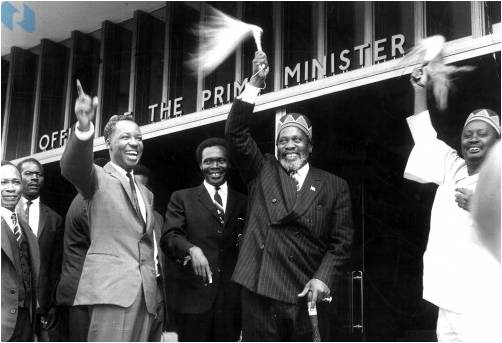CHAPTER TWENTY THREE: THE STRUGGLE FOR INDEPENDENCE IN TANGANYIKA (1939-1961)
In Tanganyika the Africans were not politically very aware until after World War 1. This was a Germany colony until after the 1918 when German was defeated in the world war that she lost all her colonies in the Africa including Tanganyika which became a UN mandate. The following were the stages in Tanganyika's path to independence:
The Bukoba Bahaya union was the first African movement in 1924. It was led by Klement Kizza who had worked for both the government and Missions. The union demanded academic education and coffee growing. They opposed the privileged chiefs under Cameroon's new system on indirect rule and the "Nyarubanja' land tenure system which was unlike the ‘mailo system.'
Kilimanjaro Native Planters Association
In the same year the Kilimanjaro Native Planters Association which was a Chagga enterprise was formed to organise the growing and marketing of coffee.
Tanganyika African Association
This was formed in 1929 to address the interests of farmers, traders and other workers in European owned factories. It was the first national movement to address national issues but only lacked strong leadership.
In 1935 the Usangi Sports and welfare club was founded for social and recreation purposes but basically the club's motives were for educational and economic self improvement.
These organizations were led by the young educated Africans who opposed chiefs established by the indirect rule policy. Among the young educated leaders was Martin Kayamba who was born in Zanzibar in 1891. He was a son of a school teacher and was educated at Kiungani UMCA School. Later he became a clerk of the Tanga District office, visited Europe and in 1922 founded , with the support of the Government, the Tanganyika Territory African Civil Service Association. Though dominated by African clerks and teachers, the Association became a meeting forum for the educated Africans of different tribes.
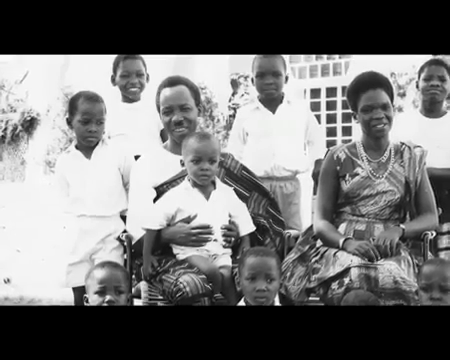
The members of this Association between 1928 and 1929 formed the Tanganyika African Association (TAA) from which developed TANU in 1954.
World War II had political effects on the people of Tanganyika. The African soldiers learnt a great deal from India, Australia, South and West Africa and South - East Asian countries. This experience gave the ex - soldiers confidence and awareness of their position in the world.

Due to the pressure of the war, the then British Prime minister Sir Winston Churchill and American President Roosevelt signed the Atlantic Charter in 1940 in which the whole world was told that the war was against oppression and dictatorship in order to secure freedom and independence to all. Armed with these new ideas the ex-soldiers were encouraged to press for independence.
The end of the World War II and the replacement of the League of Nations by the UNO, led to the mandate territories like Tanganyika falling under the new organisation.
The UN charter stated categorically that all people of the world had the right to choose their form of government i.e. a right to self - determination.
The member countries of the UNO both big and small developed a strong anti - colonial sentiment. Super powers such as Russia and the USA became equally anti - colonial. They gave support to the colonized states such as Tanganyika.
Since self - determination was extended to the colonies pressure was brought to bear on the colonial masters, notably Britain and France, to grant independence to their colonies.
The fifth Pan African Congress
As for Africa, some African politicians living in Europe organised the 5th Pan African Congress in 1945, which took place in London. It was attended by Kwame Nkrumah of Ghana, Nnamdi Azikiwe from Nigeria, and Kamuzu Banda from Malawi, Jomo Kenyatta and Tom Mboya from Kenya. The Congress led to the call for leaders of Africa to organise and prepare their people for independence. The Pan Africanists pressurized the colonial masters very much.

Due to the bad effects of the war, in the 1945 General Election in Britain, Sir Winston Churchill, the Conservative leader, was defeated and replaced by Clement Atlee, the Labour Party leader. The Labour Party exercised a decolonisation policy and by the end of 1947 India and Pakistan were independent. Secondly Britain was devastated by the war and so could not maintain her vast empire.
Appointments to the Legco
In 1945, two Africans were appointed to represent their fellow black people in the in the legislative Council. These were the first black people to represent others. These people used their positions to press for independence of Tanganyika.
T.A.A became political party in 1945
The Tanganyika African Association that was formed way back in 1929. It was a simple association of farmers and traders that was transformed into a national political party in 1945. It opened branches and recruited people of all tribes without discrimination as membership increased.
Tanganyika becomes a UN trust territory
When Tanganyika fell into the hands of the UNO it was taken care of by one of the UN organs, the Trusteeship Council. Though Britain Administered Tanganyika, the Trusteeship Council periodically sent out missions to check on the progress and listen to the people's grievances. Their reports urged Britain to quicken Tanganyika's independence. In 1949 Sir Edward Twining, the Governor of Tanganyika set up a Commission to examine and recommend what constitutional changes should be made.
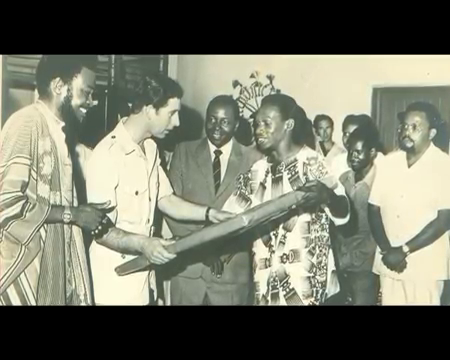
The following were the recommendations: (a) The Legco to retain its official majority. (b) Unofficial seats to be divided equally between the three races.
The second recommendation was attacked by the TAA which was pressing for either an African majority of the unofficial members or a number equal to all other races combined. In 1953 Professor Mackenzie was asked to examine the situation but he supported equal representation and the election of the unofficial members on a common roll basis.
He further recommended that each constituency was to have three contestants. His proposals were effected in 1955 when the Legco was composed of 31 official and 30 unofficial members. Two more Africans, bringing their total to three, were nominated to the Executive Council.
Kirilo's visit to the UN Headquarters
Following the eviction of 3000 Meru people from their land by white settlers, their leader Japhet Kirilo formed the Meru Citizens Union of Freemen in 1951. Through the Association, Kirilo visited the UN headquarters in New York to present the petition of his people. This was an important to step towards growth of nationalism.
In 1953, a local government Ordinance providing for removal of traditional authorities and their replacement by elected councils changed in legislative and executive council in 1951. Executive official members were 8; unofficial were 7 Europeans, 1 Asian and 1 African. Legislative official members were 15; unofficial members were 7 Europeans, 4 Africans and 3 Asians. In 1953, a speaker started presiding over the Legislative Council instead of the governor.
Nyerere becomes TAA president
When Julius K. Nyerere returned from Edinburgh University in 1953, he was elected President of the TAA, which he turned into a country - wide political party. On 7th, July 1954 the TAA was baptized Tanganyika African National Union at a meeting in Dar- es - Salaam. As a leader of TANU, he organised branches for his party all over the country. The party's Swahili slogan was Uhuru na Umoja, freedom and unity. He even resigned from teaching to have more time for national politics.
The 1954 UN mission to Tanganyika
The visiting mission of the UN in 1954 was impressed by TANU's plans and recommended that Tanganyika should become independent in a short time.
Appointment of Africans to the Executive
In 1954, the British appointed more Africans and Asians to the executive Council and trained them to handle ministerial duties immediately as a step towards to independence.
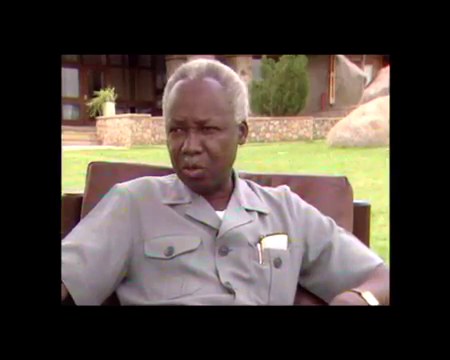
Nyerere's visit to the UN
In 1955 Julius Nyerere addressed the UN Assembly and the popularized TANU's case and soon won the UN's sympathy and respect. Members of the UN Trusteeship council were impressed with Nyerere's speeches and his approach to the issue of independence.
The 1955 elections to the Legco
In 1955, the first elections to the Legislative Council were held. The assembly was made up of 31 officials, 9 elected unofficial members of each race and one nominated from each race.
Formation of United Tanganyika Party
TANU was challenged by a new party, the United Tanganyika Party which claimed to follow a multi - racial policy which the non - Africans were supporting but TANU was more popular than this new party.
Julius Nyerere in Legco
In 1957 Julius Nyerere became a member of the Legco but he resigned his seat when the Legco rejected his demand for ‘one man one vote'
Appointment of Sir Richard Turnbull
When Sir Richard Turnbull became Governor of Tanganyika in July 1958; he took rapid action in an attempt to make Tanganyikaindependent.
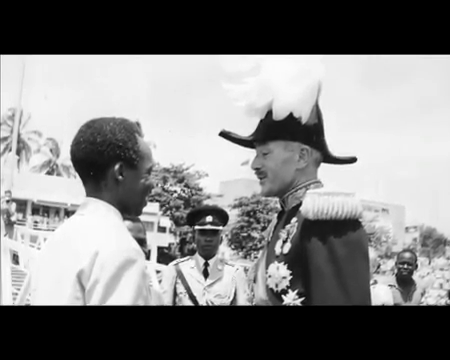
In December, 1959, Sir Richard announced that responsible government was to be achieved in 1960. The following recommendations were made:
(a) The Legco to be enlarged (71 elected members)
(b) Ten seats were reserved for Europeans.
(c) The council of Ministers to replace the executive Council.
(d) Franchise to be extended to all literate adults of those whose annual income was £75.
Creation of a Council of ministers
In May, 1959 he introduced a Council of Ministers five of whom were elected Legco members, Sir Richard planned the next constitutional changes.
The 1960 Legco elections
In 1960 neither the African National Congress, a splinter group of neither TANU nor the United Tanganyika Party could compete with TANU and so in the elections TANU won 70 of the 71 seats. Nyerere became the first chief Minister. He chose 9 members of his party to join him in the Council of Ministers in addition to 3 European Ministers nominated by the Governor.
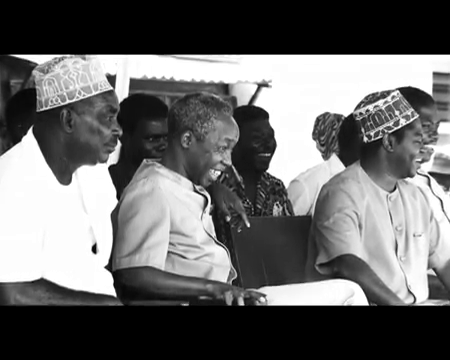
Turnbull accepted the election results as proof that Tanganyika wanted independence immediately. Finance was an important problem.
The country needed £24,000,000 for development to start straight away. Britain provided £12,000,000. Dr. Nyerere assured Asians and Europeans that they had a future on Tanganyika. He also tried to restrain extreme African racism.
Internal self-rule and independence
In May 1961, Ian Maclead, the Colonial Secretary, held a conference in Dar-es- salaam and laid down a timetable for Tanganyika's independence.
On 1st May 1961, Tanganyika attained full internal self-government and Dr. Nyerere became the first Prime Minster.
The Legislative Council became the National Assembly and asked Britain for independence on 9th December 1961. The Duke of Edinburgh representing Queen Elizabeth II, formally resigned Britain sovereignty over Tanganyika.
WHY INDEPENDENCE WAS ATTAINED IN A SHORT TIME.
Tanganyika was at first a German colony then a British colony a year after the end of World War I. She got independence in 1961 under TANU with leadership of Julius Nyerere. The historical background reveals a number of factors which enabled a non-ethnic form of political nationalism to emerge in Tanganyika in the late colonial period. A number of factors can be advanced for the smooth and speedy move to independence as well as the growth of nationalism. The following are the main factors.
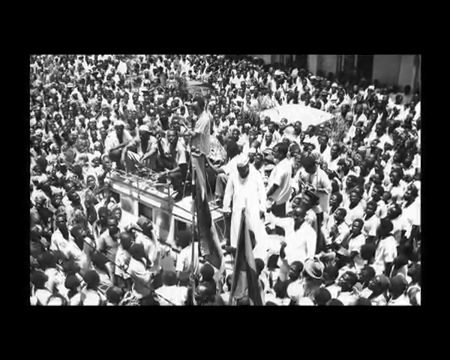
The first factor was the dispersal of Tanganyika's population. The country has been spared the deeply divisive potentialities of ethnic cleavages partly because it did not have concentrated populations in competition with one another; nor were wealth and power concentrated in the hands of one group. It is significant that although the man who emerged as leader - Julius Nyerere - came from a small community of the country, there was no strong resentment of his leadership in a society of this kind.
A second factor is the unifying role of Kiswahili as a common language for the whole country, which thus helped to cement unity among ethnic groups and provinces. Kiswahili was spread widely in pre-colonial times as a result of the extensive trading network established from the eastern Congo basin to the East African coast by interior African and coastal Swahili-Arab traders. German colonial rule provided a further powerful boost to linguistic unity when the Germans made Kiswahili the language of Western-type government and mission education. But at the same time as Kiswahili was developed as the language of the Western-educated elite it was not an elite language, and served as a means to unite all sectors of the African population.

Role of Maji maji rebellion: A third factor is the example of non-ethnic resistance to colonial rule provided by the Maji Maji Rebellion of 1905-07. The significance of the rebellion for later generations of Tanganyikans was not its tragic failure and the brutal suppression that followed it. But rather the way in which numerous ethnic communities of the south-eastern part of the country found common cause and achieved a unity that overrode their earlier divisions and mutual suspicions,
The Maji-Maji Rebellion influenced later Tanganyikan nationalism in other ways apart from inspiration. The failure of violent resistance against colonial rule led to a realization that peaceful forms of political activity might achieve more for the people. After the First World War a number of locally based voluntary welfare associations and unions emerged, aiming to raise living standards by self-improvement and self-help. Examples were the Bukoba-Bahaya Union (1924) and the Kilimanjaro Native Planters Association (1925).
The activities of TANU: This was a party that was formed in 1954 after being transformed from T.A.A. TANU was a mass party that was so popular and had branches in every region of Tanganyika. Unlike other African countries that had so many parties struggling for power, Tanganyika had one powerful party.

The determination of the United Nations. In 1946, Tanganyika became a U.N trust territory under British supervision. The UN took a step towards the decolonisation of Tanganyika by listening to their grievances and forcing the British to handover independence.
The work of Sir Richard Turnbull, the Governor 1958 - 1961. He was a liberal, calm and a more peace loving governor who wanted to avoid violence like what had taken place in Kenya during the Mau Mau war. He was very friendly to the nationalists like Nyerere and Rashid Kawawa.
The existence of few white settlers in Tanganyika made the struggle for freedom relatively easy for nationalists therein.
Linguistic unity was equally important in the struggle to achieve freedom in Tanganyika. Even during the British colonialism, Kiswahili remained a medium of instruction thus enabling the people of Tanganyika to easily exchange nationalistic ideas.
The role of Tanganyika African Association (TAA) should also be mentioned.
Colonialism itself was self destructive in Tanganyika. It came to Tanganyika with bad laws, bad policies for example over taxation, forced labour, and racism which created a class of aggrieved Tanganyikans.
The Mau Mau uprising acted to save the people of Tanganyika from colonialism.
The absence of religious differences in Tanganyika was of advantage in the struggle to attain freedom in Tanganyika.
The composition of Tanganyika's population was also a factor to reckon with. Tanganyika was comprised of large tribal communities e.g. the Sukuma, Yao, Hehe. These tribes had no tendencies of interfering with and disorganizing others' affairs.
The Manchester conference was among the key factors.
Indians independence also helped the Tanganyikans in their struggle for independence. India provided inspiration to Tanganyika; her independence became a ray of hope for African countries' turn to struggle and get similar independence.
Ghana's independence achievement should also be mentioned.
The role of Julius Nyerere was instrumental in the demise of colonialism in Tanganyika.
The role played by Richard Turnbull was also instrumental in the achievement of independence in Tanganyika.
Role of Tanganyika African National Union (TANU)
In 1953, Dr. Julius Nyerere was elected president of the TAA (Tanganyika Africa Association). It had no political influence and had only a small number of members who were all educated Africans. He re-organised TAA and transformed it into an effective organ of national politics.
In 1954, its name was changed to Tanganyika African National Union. Its aim was to fight tribalism and unite all nationalists. TANU wanted political, social and economic advance for Africans and above all, it worked for self-government and independence.
 It
took months before the majority of people realised the value of TANU. Branch
members still used destructive methods to protest against the government for
example preventing dam-building, stopping pest-control, among others, some
branches were closed. However, under the leadership of Dr. Nyerere and Oscar
Kambona, the General Secretary, the movement spread and won friendship.
It
took months before the majority of people realised the value of TANU. Branch
members still used destructive methods to protest against the government for
example preventing dam-building, stopping pest-control, among others, some
branches were closed. However, under the leadership of Dr. Nyerere and Oscar
Kambona, the General Secretary, the movement spread and won friendship.
By 1957, TANU was the only national party demanding independence.
The united Tanganyika party (UTP) was formed in 1956 by those who disliked TANU's programme and wanted a multi-racial government. Both TANU and UTP bitterly attacked each other.
In an attempt to reconcile the government and TANU, Dr. Nyerere was appointed to the Legislative Council. He resigned after a few months because of disagreements over constitutional issues. In 1958, elections for new Legislative council members of all races were held on a national franchise.
TANU supported candidates of different races in every area and all its candidates went through. UTP was defeated and the organisation was disbanded. TANU's prestige increased.
How TANU prepared Tanganyika for Independence
Formed in 1954 from TAA by Nyerere
It was a mass political party
It was discipline, progressive party
Modelled on Nkrumah's CPP
Aimed to create spirit of national unity and to achieve independence.
Slogan was "Freedom and unity" (Uhuru na Umoja)
Used peaceful means to achieve independence of Tanganyika
Used peoples problems to turn them into national struggles.
Allied with trade Unionists to fight British imperialists.
1954 TANU invited the UNO Mission to visit Tanganyika
1955 TANU issued a petition to the visiting UNO mission
Originally rejected the multi racial elections of 1958 but later accepted it.
1958 TANU defeated its rival -United Tanganyika Party (UTP) in the legislative elections.
1959 5 members of TANU entered the executive council
1960 scored another victory in the Fresh elections to the Legco.
TANU worked well with Governor Richard Turnbull to achieve independence for Tanganyika
1961, Britain handed over power to a single mass political party TANU under the leadership of Nyerere.
Other factors that contributed to quick independence were Lack of political tensions, lack of religious conflicts, role of Kiswahili as a uniting factor, Lessons from the failed past resistance wars like the Hehe, Abushiri and the MajiMaji, Strong foundation for anti colonial struggles laid by TAA, Role of UNO since Tanganyika was just a UN mandate, The Maumau revolt in Kenya, realisation by the local people of the bad effects of colonialism and finally the role Nyerere.
Contribution of Sir Richard Turn Bull to the History of Tanganyika
Turnbull was appointed governor of Tanganyika on 1st July 1958.
He had worked in Kenya as the Chief Secretary during the Mau Mau rebellion.

When he became governor of Tanganyika he wanted self-government unfolded in Tanganyika as soon as possible.
In 1959 he introduced a Council of Ministers of which five were elected members of the Legislative council.
He appointed a committee under Sir Richard Ramage to work out constitutional advance.
At the end of 1959 Turnbull announced the formation of a responsible government for Tanganyika in 1960.
In the 1960 elections TANU won a landslide victory and Nyerere formed a government.
Nyerere was a Tanzanian statesman who worked hard for independence and later became president from the time of independence until he handed over power in 1985.
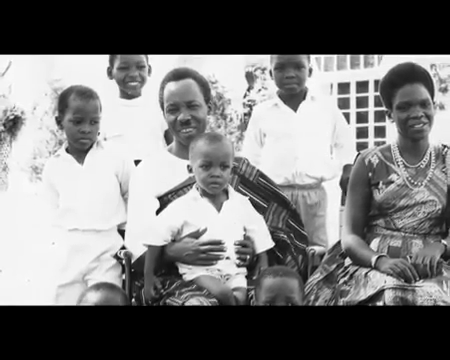
He was born in 1922 at Butiama, Musoma district, along the shores of Lake Victoria in Northern Tanzania. His father Nyerere Burito was a local chief in the area. Nyerere's mother, Kambarage was one of his 22 wives and Nyerere took up his mother's name.
For his education, Nyerere went through Mwisanje primary school and then Tabora government secondary school and finally joined Makerere University College in 1942 at the age of 20 for a three years diploma course in education. He graduated in 1945.
He returned to Tanzania and began teaching History, English and Biology at St. Mary's college Tabora. His good work in teaching earned him the title of Mwalimu, meaning respectable teacher.

He later went to University of Edinburg in Scotland where he acquired a Master of Arts degree in history and administration. While he was abroad, Nyerere participated in politics as a student. He also learnt more of the attitude of the colonialists towards Africa. He therefore planned accordingly
He returned from Scotland in 1952 and in 1953 became the President of Tanganyika African Association (TAA), a political party of that time. TAA was a small association formed in 1929 but had branches countrywide. It was made up of farmers, teachers, doctors and other workers
A year after, he founded a real non- racial political party called the Tanganyika African national Union (TANU). As a leader of TANU, he organised branches for his party all over the country. The party's Swahili slogan was Uhuru na Umoja, freedom and unity. He even resigned from teaching to have more time for national politics.
In 1955, he represented his people to UN demanding political independence for Tanganyika. Members of the UN Trusteeship council were impressed with Nyerere's speeches and his approach to the issue of independence. Nyerere used to say that "We shall tell the British to grant us independence; if they refuse, we shall go to the UN; if we fail there we shall report them to God"[1]
In the same year (1955), he was elected as President of the Legco, which he had joined in 1953. Legco was a form of parliament which was largely composed of whites.
He resigned after 2 years because the Legco made not making strenuous effort towards independence. Their approach was far different from what Nyerere wanted. He was banned from making speeches all over the country. Even 12 TANU branches were closed and Nyerere was tried in court but was found innocent.
In 1958, elections were conducted in the Legco and TANU emerged as the largest single party demanding for independence and for a non-racial democracy. Other participants in the elections were Europeans and Asians. TANU won 29 out of the 30 contested seats. Nyerere was appointed a Chief minister and later a Prime minister.

In the elections of 1960, TANU won overwhelmingly by scoring 70 out of the 71 seats contested in parliament. TANU was a very popular party. Other parties which participated, in the elections were for Indians and Whites.
In October 1961, Tanzania became independent with Nyerere as its Prime minister. Nyerere surprised everyone when he resigned after seven weeks in power. He handed over power to Rashid Kawawa. He only returned to power in 1962 when a constitution was amended to make Tanganyika a republic. He was elected president of Tanganyika in 1962 before being elected president of the United Republic of Tanzania (Tanganyika and Zanzibar) in 1964.

Nyerere instituted the spirit of freedom and work that is "Uhuru na Kazi" in Tanzania thus arousing more freedom and independence. He was a simple and hard workingman. "Nyerere was one African leader who understood the poverty of his people and reflected it in his lifestyle" wrote Fatima Meer.
It was Nyerere who advocated for federation of East African countries but later led to the formation of the East African Community in 1967.
Nyerere was among the 32 African leaders who participated in the formation of Organization of African Unity in 1963.
In 1964, he demonstrated the type of unity African states should follow by merging Zanzibar with Tanganyika to form Tanzania. This was after the bloody Zanzibar revolution that led to the over throw Oman Arab led government. The Afro‑shiraz party of Zanzibar and TANU also merged leading to CCM, Chama Cha Mapinduzi (Party of the revolution).
Nyerere is remembered for living to his word. " Tanzania cannot be fully liberated until the whole of Africa is liberated," he said. Mozambique, Namibia, Zimbabwe and south Africa always remember Nyerere as a man who helped deliver them from colonial rule. Dar-es-salaam was the headquarters of the Frontline movement.
Nyerere pursued socialist economic policies for Tanzania immediately after the famous Arusha declaration in 1967. Ujamaa villages were established all over the country for national development. However, he later on dropped this policy in favour of capitalism.
Ugandans remember Nyerere for the step he took to liberate Uganda from the dictatorial regime of Idi Amin. The Tanzanian army and other Ugandans fought Amin's soldiers.
Nyerere created unity in Tanzania. 127 ethnic groups were united together with one language.
He retired as president of Tanzania in October 1985. Power was handed over to Hassan Mwinyi as president. Nyerere only remained as chairman of the CCM party until he died.
The third world's most famous teacher lost the battle to the cancer of the blood known as Leukemia. This was in St' Thomas hospital in London on October 14th 1999 at the age of 77. With his wife Maria, he left five sons and three daughters.
ZANZIBAR
By the middle of the 1950, Zanzibar was politically quiet. In 1954, the Resident Governor, Sir John Rankine proposed that the Legislative Council should be made up of more representatives.
In 1955, a new council was appointed with an official side made up of 4 Africans, 4 Arabs, 3 Asians and 1 European. The Arabs boycotted the Council because they wanted an unofficial majority and a Privy Council which would advice the Sultan.
In 1956, the Resident Governor allowed six of the twelve unofficial seats on the Legislative Council to be filled by election. This led to the rise of political parties to contest on the election.
Political parties
The Arabs formed the Zanzibar Nationalist Party and to oppose it, the Afro- Shiraz Party was established. The ASP was successful in the 1958 election.
In 1960, a committee was set up to consider the next step, to self-government. It recommended that: There should be 21 elected members in the Legislative Council who should form a majority.
Secondly, the Resident's place in the Council should be taken over by a speaker.
Thirdly, the government of Zanzibar should be for all the people.
Fourthly, after elections, the leader of the winning party should become the chief minister. Also, the chief Minister should head the Executive Council and joined by four ministers.
The recommendations were accepted and the elections were held in January 1961. Another party was formed "Zanzibar and Pemba peoples Party".
In the elections, the ASP won ten seats, the ZNP nine and the ZPPP three. Attempts to form a government failed and the ZPPP members were divided so that they gave both the ASP and ZNP eleven members each.
A coalition government was formed until new elections could be held in June. However, there were conflicts caused by international politics.
Arabs who had been to Russia or china returned and spread communist ideas. People with similar ideas came from Tanganyika. The result was a series of riots during the June elections when 68 people were killed.
A state of emergency was declared and troops from the mainland were brought to restore peace.
Election results
The ASP and ZNP both won 10 seats and the ZPPP 3. ZNP and ZPPP combined to from a government led by Sheikh Muhammad Shamte the ZPPP Chairman).
The government stated that it wanted independence in 1962. On 24th June 1963, Zanzibar obtained internal self-government. A cabinet made up of a prime minister and seven ministers replaced the Executive Council. The Legislative Council became the National Assembly with 31 elected members.
In July 1963, elections were held- 13 ASP, 12 ZNP and 6 ZPPP were elected. Sheikh Muhammad Shamte therefore led Zanzibar to independence on the 9th December 1963.
Afro-Shirazi Party (A.S.P.) in Zanzibar
ASP was a political party in Zanzibar formed in 1957. It won six seats in the 1957 elections and this prompted the drawing of the programme for the independence. Its leader Karume demanded rapid advancement to self-government. However, ASP lost the June elections to Zanzibar National Party (ZNP), which took the country to independence in December 1963.
Watch the video by clicking on the photo below:
In 1964 after the January revolution the ASP absorbed UMMA Party and captured power in Zanzibar.
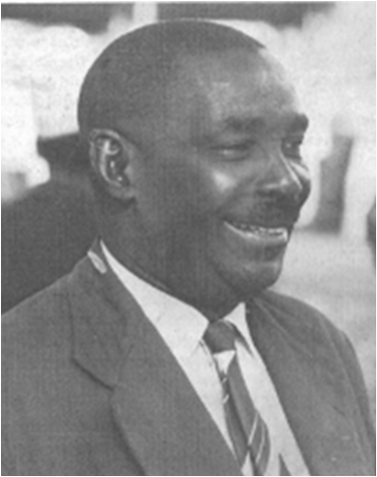
Karume was the party leader and President of Zanzibar from 1964 when Zanzibar married with Tanganyika to form Tanzania.
In 1964, Karume of ASP acted as the first vice president of the union.
In 1977 the ASP merged with TANU to form Tanzania's only legal party, Chama Cha Mapinduzi.
[1] Quoted from Kanyama Chiume, Panaf Great Lives Books, 243 Regent street London, 1982 p.101
Licensed under the Developing Nations 2.0
A Complete East African History ebook
